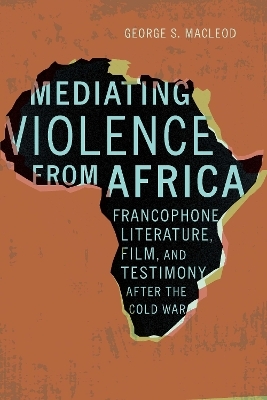
Mediating Violence from Africa
Francophone Literature, Film, and Testimony after the Cold War
Seiten
2023
University of Nebraska Press (Verlag)
978-1-4962-3063-8 (ISBN)
University of Nebraska Press (Verlag)
978-1-4962-3063-8 (ISBN)
Mediating Violence from Africa examines how both African and non-African French-speaking authors, filmmakers, editors, and scholars have packaged, interpreted, and filmed the violent histories of post–Cold War Francophone Africa.
Mediating Violence from Africa explores how African and non-African Francophone authors, filmmakers, editors, and scholars have packaged, interpreted, and filmed the violent histories of post–Cold War Francophone Africa. This violence, much of which unfolded in front of Western television cameras, included the use of child soldiers facilitated by the Soviet Union’s castoff Kalashnikov rifles, the rise of Islamist terrorism in West Africa, and the horrific genocide against the Tutsi in Rwanda.
Through close readings of fictionalized child-soldier narratives, cinematic representations of Islamist militants, genocide survivor testimony, and Western scholarship, George S. MacLeod analyzes the ways Francophone African authors and filmmakers, as well as their editors and scholarly critics, negotiate the aesthetic, political, cultural, and ethical implications of making these traumatic stories visible. MacLeod argues for the need to periodize these productions within a “post–Cold War” framework to emphasize how shifts in post-1989 political discourse are echoed, contested, or subverted by contemporary Francophone authors, filmmakers, and Western scholars.
The questions raised in Mediating Violence from Africa are of vital importance today. How the world engages with and responds to stories of recent violence and loss from Africa has profound implications for the affected communities and individuals. More broadly, in an era in which stories and images of violence, from terror attacks to school shootings to police brutality, are disseminated almost instantly and with minimal context, these theoretical questions have implications for debates surrounding the ethics of representing trauma, the politicization of memory, and Africa’s place in a global (as opposed to a postcolonial or Euro-African) economic and political landscape.
Mediating Violence from Africa explores how African and non-African Francophone authors, filmmakers, editors, and scholars have packaged, interpreted, and filmed the violent histories of post–Cold War Francophone Africa. This violence, much of which unfolded in front of Western television cameras, included the use of child soldiers facilitated by the Soviet Union’s castoff Kalashnikov rifles, the rise of Islamist terrorism in West Africa, and the horrific genocide against the Tutsi in Rwanda.
Through close readings of fictionalized child-soldier narratives, cinematic representations of Islamist militants, genocide survivor testimony, and Western scholarship, George S. MacLeod analyzes the ways Francophone African authors and filmmakers, as well as their editors and scholarly critics, negotiate the aesthetic, political, cultural, and ethical implications of making these traumatic stories visible. MacLeod argues for the need to periodize these productions within a “post–Cold War” framework to emphasize how shifts in post-1989 political discourse are echoed, contested, or subverted by contemporary Francophone authors, filmmakers, and Western scholars.
The questions raised in Mediating Violence from Africa are of vital importance today. How the world engages with and responds to stories of recent violence and loss from Africa has profound implications for the affected communities and individuals. More broadly, in an era in which stories and images of violence, from terror attacks to school shootings to police brutality, are disseminated almost instantly and with minimal context, these theoretical questions have implications for debates surrounding the ethics of representing trauma, the politicization of memory, and Africa’s place in a global (as opposed to a postcolonial or Euro-African) economic and political landscape.
George S. MacLeod is an associate professor of French at St. Mary’s College of Maryland.
List of Illustrations
Acknowledgments
Notes on Sources and Translations
Introduction: Iconic Figures and Post–Cold War Mediations
1. Using the Child Soldier
2. Filming Terrorists, Filming Timbuktu
3. Rwanda’s Tutsi Survivors
4. The Celebrity Humanitarian Ally
Conclusion: Mediating Violence from Africa in the Post–Post–Cold War Period
Appendix: Data Visualization of Vénuste Kayimahe’s Marginalizations in Discussions of “Rwanda: Writing as a Duty to Remember”
Notes
Bibliography
Filmography
Index
| Erscheinungsdatum | 26.08.2023 |
|---|---|
| Zusatzinfo | 2 illustrations, 1 appendix, index |
| Verlagsort | Lincoln |
| Sprache | englisch |
| Maße | 152 x 229 mm |
| Themenwelt | Geisteswissenschaften ► Geschichte ► Regional- / Ländergeschichte |
| Sozialwissenschaften ► Kommunikation / Medien ► Medienwissenschaft | |
| Sozialwissenschaften ► Soziologie | |
| ISBN-10 | 1-4962-3063-9 / 1496230639 |
| ISBN-13 | 978-1-4962-3063-8 / 9781496230638 |
| Zustand | Neuware |
| Haben Sie eine Frage zum Produkt? |
Mehr entdecken
aus dem Bereich
aus dem Bereich
Erinnerungen
Buch | Softcover (2024)
Pantheon (Verlag)
CHF 22,40


